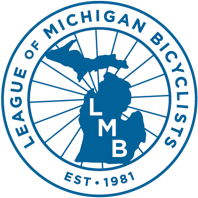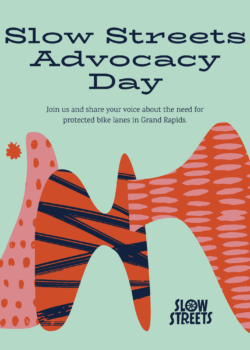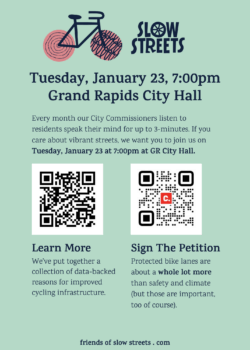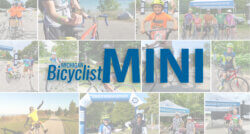
In this issue:
- Introduction
- From Bikes to Kidneys: Tracy Besek’s Remarkable Generosity (Gina Apone)
- Asking for Protected Bike Lanes in Grand Rapids (Arielle Leipham Ellis)
- Doing the Most with Compost (Zoë Bakker)
- Exploring E-Bike & Trail Etiquette with TART Trails (Jonny Tornga, TART Trails Outreach Coordinator)
- Welcome to New LMB Lifetime Member
- Throwback Art – A Dress-Friendly Tricycle from 1887
- LMB Rings in 2024… (LMB Staff)
Welcome to latest issue of Michigan Bicyclist Mini (MBM), your go-to newsletter for shared information, stories, and advice on all things bicycle safety, education, and infrastructure from fellow members of the community.
This bi-monthly digital publication will act as a channel for members of the community to connect and will be fun, useful stuff from bicyclists for bicyclists. We want to hear from YOU. If it’s about biking, we hope you’ll send it in for future issues! We’re currently accepting submissions on a rolling basis. Please submit to [email protected].
We’ve also brought back a similar publication for MMBA’s trail and gravel cyclists, Bent Rim Bugle (new issue coming soon!). Both of these community newsletters aim to provide a platform for ALL bicyclists to share with and inform one another on all things biking. Please enjoy!
From Bikes to Kidneys: Tracy Besek’s Remarkable Generosity
Written by Gina Apone
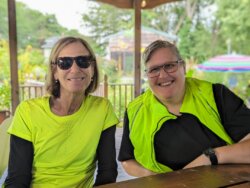
Branis (left) and Tracy attending the Dahlia Festival in Detroit by bike.
LMB’s own board member, Tracy Besek recently donated a kidney to her dear friend, Branis Pesich and went through what was a lifesaving transplant in November 2023. Cycling first brought Tracy and Branis together eight years ago and they grew close while participating in many group cycling events in Dearborn and Detroit. The two were often together when leading the Bike Dearborn events or riding with various other social cycling groups. Their bond strengthened after a mutual friend met a near fatal collision on bike by a reckless driver.
While the transplant operation took place in late November, it was a long road leading up to it. Branis first went through almost two years of consistent testing before finally being approved in October. In Today@Wayne’s article, “Former Wayne State cycling event helps bring together life-saving kidney transplant for WSU alumna,” Branis shared “it was almost 18 months of testing and requirements to make sure I was worthy of receiving a transplant.”
As soon as Tracy heard the news back in March that her friend was going to soon need a kidney transplant, she acted without hesitation. She shared in the previously mentioned article, “Branis is a lot like me, not really one to reach out and ask for help. But she shared with me the struggle and how she was going to start requesting help looking for a kidney donor and would be going on dialysis.” Tracy could see the toll this experience was having on her friend and cycling partner’s health. “From that moment, I knew that whether I was a match blood type-wise or not, I was going to do what I could to help my friend.”
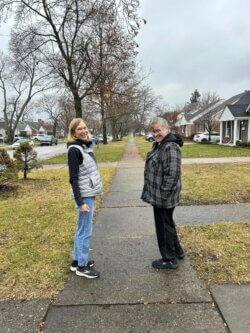
Branis (left) and Tracy walking together during recovery.
After discovering that her blood type was a direct match for Branis in March, Tracy held off on revealing her plans. She explained that she waited “in case the doctors came back and told me my kidney was no good for her, I didn’t want to provide false optimism.” It wasn’t until getting the green light from doctors after undergoing multiple rounds of testing to make sure her body could support her health with one kidney that she revealed her plans to Branis. In August, once she was positive that the transplant could happen, Tracy pulled Branis aside after the Annual Dearborn Homecoming bike ride together and told her the news. Tracy as the donor and Branis as the recipient had to go through several more steps of the testing process before their surgeries were officially scheduled.
The successful operation took place in late November. Fortunately, neither Tracy nor Branis had to face post-surgery recovery alone thanks to their supportive caretakers. Mutual friend, Jennifer Moss and Tracy’s husband, John coordinated and took time off work to provide the best care for Tracy and Branis when they came home from the hospital as well as throughout their first few weeks post-surgery.
We’re proud to recognize Tracy for her unselfish gift and we wish for a smooth and speedy recovery for both her and Branis!
Learn more about becoming a kidney donor here.
Join Friends of Slow Streets in asking for Protected Bike Lanes in Grand Rapids
Submitted by Arielle Leipham Ellis
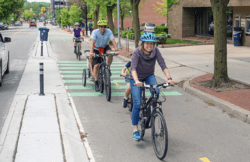
Friends of Slow Streets (a resident-led, multi-modal advocacy group) founder, Arielle Leipham Ellis, is urging residents to ask for protected bicycle lanes in the City of Grand Rapids at the group’s quasi-advocacy day on January 23rd, 2024.
Friends of Slow Streets spun up this past spring. We had a clear vision from the start: move the needle on protected bicycle lanes and pathways, but not for the usual reasons we hear. We knew, in addition to safety and environmentalism, protected bicycle lanes are a huge driver of economic activity, talent attraction, tourism, wealth-building, and independence. We knew walkable, bike-able, amenity-rich communities are part of the foundation of a magnetic, vibrant city. And we thought, that is a story worth telling. 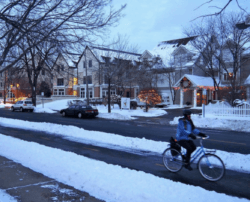 Protected bicycle lanes are excellent for business. On average, cyclists visit more frequently and spend 20% more per month at local businesses than drivers.
Protected bicycle lanes are excellent for business. On average, cyclists visit more frequently and spend 20% more per month at local businesses than drivers.
Protected bicycle lanes are great for family savings. Transportation is the second largest item in the household budget averaging over $12,000/year. If one or more members of the family can get around safely without a car, this can be one of the fastest ways to save and build wealth.
Protected bicycle lanes could dramatically improve the issues that Grand Rapids Public Schools has been experiencing with Dean Transportation. There aren’t enough drivers to transport all of the children that need the bus every day. Yet, many kids live within easy biking distance to school. The trouble is, it is not safe for them to travel by bike in our city.
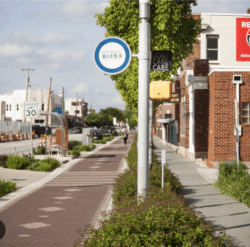 Protected bicycle lanes attract talent, and talent attracts business investment. Three quarters of the population wants vibrant, walkable neighborhoods with people-oriented streets and great places to walk or bike to. The data says we need to have more mobility options to attract top talent and improve quality of life. A comprehensive network of connected protected bicycle lanes is the cheapest, most efficient way to get the job done.
Protected bicycle lanes attract talent, and talent attracts business investment. Three quarters of the population wants vibrant, walkable neighborhoods with people-oriented streets and great places to walk or bike to. The data says we need to have more mobility options to attract top talent and improve quality of life. A comprehensive network of connected protected bicycle lanes is the cheapest, most efficient way to get the job done.
Other cities and places that look and feel like Grand Rapids have told us that in order to increase bicycling, walking, scooting, and rolling: we need to build the protected infrastructure that provides a low-stress, dignified way of getting to and from where you want to go–and it needs to be connected, and commonsense.
We love cars and we know they play a critical role for mobility in West Michigan. For a long time to come, cars will continue to be an essential part of the mobility framework. But for too long cars have been the only mobility option in nearly every public space in the region. Let’s begin to create a city that offers more spaces where people and prosperity are the priority and cars are one of several good options.
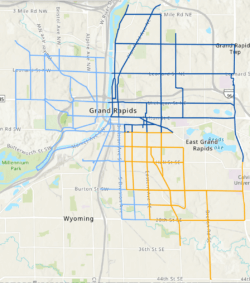
The Map: Above is our proposed network of protected bike lanes across the three wards of Grand Rapids. It is focused on connecting parks, schools, neighborhoods, cultural attractions, and economic centers.
West Michigan likely has more than 10 parking spaces for every car in the region. That parking consumes some of the most valuable land in our community and it is impacting everything from where more housing can be built, to who is invited to enjoy our city, and how safely they can move around our community. It also has a dramatic impact on quality of life and local tax revenues. Very few people are excited to dine outdoors next to a 3 acre parking lot, or live in a building that overlooks 150 parking spaces. Yet the only reason we believe all of this parking is necessary is because it is so difficult to move around the City by any means other than the car.
We are asking our West Michigan community to come advocate for people-centered design. Let’s design our city in a way that welcomes people to come by car, by bike, by transit, or on foot.
Let’s design and invest in our infrastructure in a way that makes any option a great option in Grand Rapids.
Let’s make data-driven decisions that will increase our economic engine, make better use of our existing infrastructure, attract and retain talent, provide choices for everyone, and build the wealth of residents.
We ask you to broaden your view of what you have been told is possible. We ask you to think bigger, more creatively, more intentionally. To design for ourselves, our children, our future. My fellow Michiganders, if not now, when? If not us, who? There is no one else coming.
I’ll see you at City Hall in Grand Rapids on Tuesday, January 23rd at 7:00pm.
Arielle Leipham Ellis lives in Grand Rapids with her husband and two young children. When she isn’t working she spends her free time volunteering on economic development boards, neighborhood organizations, and loves to throw block parties. Learn more at friendsofslowstreets.com. Contact [email protected] with questions.
Doing the Most with Compost
Submitted by Zoë Bakker
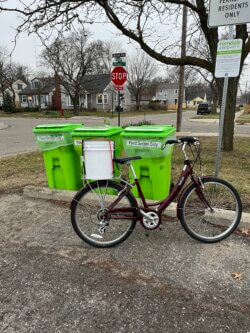
Photo by Zoë Bakker of a Compost Dropoff Station at Geary Park in Ferndale.
Two years ago, the city of Ferndale started a free residential compost program. Participants received guidance on what could be composted and a 5 gallon bucket to use to drop off food scraps at half a dozen spots around the city. Since the program started, I haven’t had to worry about kitchen smells and I’ve reduced my trash to one bag a month. About every other week, I strap my bucket to my bike and pedal my way over to one of the sites. I ride my bike for exercise and for fun, but also to live a more eco-friendly life, and I love combining cycling with a sustainable action. It gives me a great reason to get outside for a quick ride (even in December when I took this picture) and has led to several conversations with neighbors about how they can get into composting, too. I feel extremely fortunate to live in a community that really values sustainability and bikeability.
Exploring E-Bike & Trail Etiquette with TART Trails
Submitted by Jonny Tornga, TART Trails Outreach Coordinator
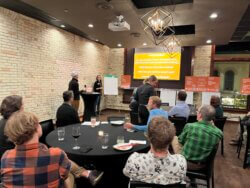
TART Trails hosted a successful Community Planning Session in November. Many thanks to community partners, local government, and bicycle retail and rental shop reps who gathered with TART Trails staff to explore more about E-Bikes & Trail Etiquette along the TART Trails network in and around the Traverse City region.
We took a look back on the summer season, shared achievements, and strategized for future efforts to cultivate a culture of kindness for both locals and visitors on the trails. The group brainstormed initiatives to enhance inclusivity and promote the enjoyment of outdoor trails for all. Working together, we are eager to implement these ideas over the coming year. A special shout out to Red Ginger of Traverse City for graciously hosting us!
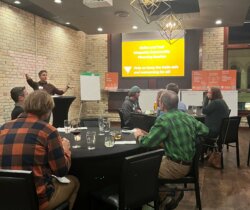
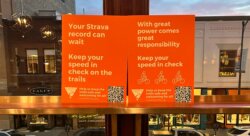
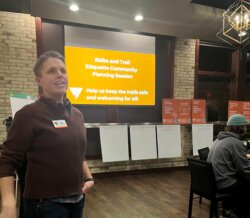
Welcome to LMB’s Newest Lifetime Member
Special thanks to our newest Lifetime Member, Michiana Bicycle Association (MBA)!
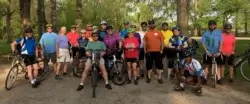
Serving the Michiana area since 1974 to promote fitness, friendship, and fun through cycling, MBA club members include cyclists of all abilities and ages. The MBA sponsors five weekly rides during the riding season and three weekly rides year-round (weather permitting).
The MBA also sponsors the annual Amishland & Lakes bike tour. This classic bike tour is based in LaGrange, Indiana in the center of northern Indiana Amish country. There are wide open spaces, clean country air, and friendly people. Amishland and Lakes is famous for great SAG food (watermelons, peaches, blueberries, bananas, and freshly baked cookies). The routes offer smooth, quiet roads, where buggies are numerous and cars are few. There are Amish bakeries, restaurants, and homemade ice cream parlors along the route for riders who want to “get a taste” of the local flavor. Visit their website to learn more.
LMB Rings in 2024…
As we say goodbye to 2023, we want to start the new year in the right gear! LMB staff took a moment to share some intentional goals for 2024:
Neal Glazebrook, Events Director
“To get to ride on each LMB event one day with our riders and supporters!”
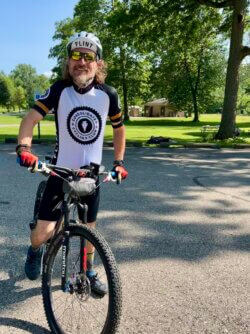
Jessica Lanave, Outreach Coordinator
“Tandem ride the Genesee Wanderers Tuesday night Lennon ride with friends at least twice a month and ride the Assenmacher 100 route twice (at least the 100k). As the A-100 Ride Coordinator, I don’t ride the day of. Explore more of Michigan on the tandem, with Jim.”
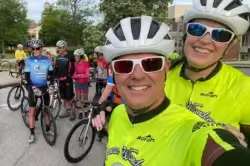
A Dress-Friendly Tricycle from 1887
In each issue, we’re highlighting a piece of classical art from the Library of Congress archives. Check out this 1887 aquarelle print by L. Prang & Co. titled Bicycling / Hy Sandham.
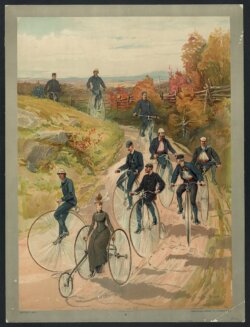
L. Prang & Co. Bicycling / Hy Sandham. 1887, Library of Congress Prints and Photographs Division, Washington, D.C.
Categorised in: Michigan Bicyclist Mini, Uncategorized
